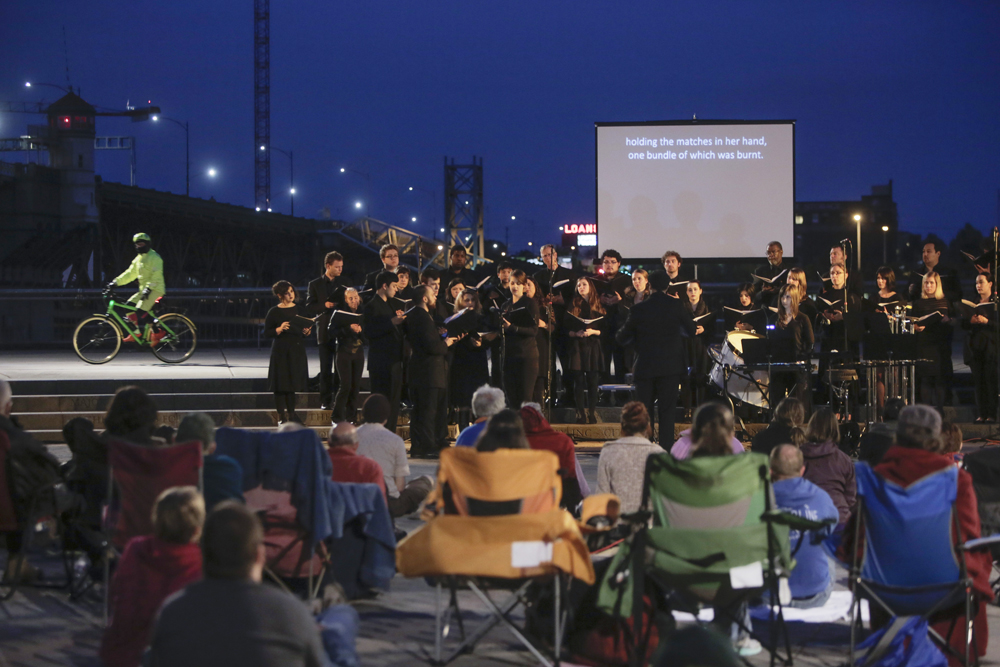The Portland State Chamber Choir finished their performance season with the Little Match Girl Passion on May 17 and 19 at St. Stephen’s Catholic Church in SE Portland. The chamber choir, who have been awarded several international medals, sung several somber arrangements before launching into the Little Match Girl.
In addition to the weekend performance, the Portland State Chamber Choir also teamed up with New Avenues for Youth to sing an outdoor performance under the Burnside Bridge on May 19 to raise awareness of the homeless youth epidemic in the city.
“It’s a very cool collaboration between social services and the arts,” said Suzanne Gray, marketing manager for the College of the Arts, in an email. “The Little Match Girl Passion is a haunting choral work about poverty and homelessness based on the Hans Christian Andersen story of the same name…we’re expecting a significant crowd, including homeless youth, at the event.”
The Little Match Girl is a long-loved fable from Hans Christian Anderson, which follows the tragic death of a young girl who freezes to death while striking matches to stay alive.
The child has been sent out into a snowy New Year’s Eve evening to sell the matches to bring money back home. Desolate and unsuccessful at selling a single match, the girl hunkers down into a corner to attempt warming herself.
As she strikes the matches, she sees images of her deceased grandmother, ready to take her up to heaven. As the girl strikes the last bundle of matches, her grandmother stoops down to walk the girl into Eternity.
David Lang used the compelling story of Hans Christian Anderson to compose the Little Match Girl Passion, which won the 2008 Pulitzer Prize.
Choir director and conductor Ethan Sperry prefaced the evening’s performance by reminding audience members that, the word passion comes from the Latin root suffering. The topic of suffering certainly seemed to be the highlight of the performance.
The pieces selected for the evening’s performance perfectly mirrored the sorrow and suffering of the Little Match Girl.
Sergei Rachmaninoff’s “Blessed Art Thou, O Lord,” classic spiritual “Give Me Jesus,” Gregor Sviridov’s “Inexpressible Wonder,” and an original student work by Ara Lee, titled “Aho,” all supported the extremely somber and reflective mood. Lee wrote the score after a close friend died.
The mournful composition drew from many spiritual and religious practices to help make sense of deep lament or mourning, calling out to various deities and spirits to come down, asking them to “teach [us] how to live, how to love.”
“Blessed Art Thou, O Lord,” composed by Sergei Rachmaninoff, is a somber composition from his “All-Night Vigil,” which Rachmaninoff composed in two weeks.
The song is based off a Russian Orthodox all-night vigil ceremony, and focuses on an Orthodox chant used during vespers. The message is similar to that of ancient prophets or the disciples at the tomb of Jesus after his crucifixion.
“Give Me Jesus” is an old African-American spiritual that was also sung out of a place of deep lament or distraught emotional turmoil. Arranged by Sperry, this classic song of praise and sorrow featured many beautiful harmonies.
“Inexpressible Wonder,” written by Gyorgy Sviridov, is the perfect, simple statement of how there are times when words fail to communicate what is too deep to speak. Instead, it must be sung.
As Sperry put it, “[it is the] musical essence of the inexpressible.”
The evening ended with several pop song arrangements, inviting former choral members in the audience to join them for the encore performances, which concluded the performance on a much lighter note.






